Block Tops Inc. Rocks the Golden State
Beginning with the California Gold Rush of 1848, then on to the Golden Spike Ceremony in 1869, proclaiming the completion of the First Continental Railroad, California was well on its way to being a growth machine due to agriculture, oil, and shipping revenues. People from all walks of life saw the enormous opportunities from this growing economic powerhouse, and Horace Greeley’s “Go West, Young Man” became the phrase of the day.
Now fast forward to the 1950s. Much of California had grown into a huge collection of cities and towns, linked together by freeways and mass transportation. Aerospace, electronics and Hollywood, to name a few, had positioned the Golden State as the most progressive state in the union.
By the 1970s, lifestyles had risen to the point where creature comforts such as great food, fancy clothing and upscale homes with classy furnishings were in high demand. While natural stone quarried both domestically and in Europe did satisfy most lifestyles, beautiful varieties of hardwoods logged in northern California, Oregon and Washington became vogue, especially in the form of butcher block countertops, recalled Block Tops President Nate Kolenski.
“Seeing this demand in 1977, Block Tops Founder Damien Bates, who was probably the first craftsman in southern California to produce oak butcher block tops, built them for homes as well as restaurants. That was the company, and he added maple wood, later on. I’m not positive, but I think he bought a train car load of it!”
Kolenski joined the company in 1996, and currently shares the helm with CEO Vanessa Bates, the wife of now retired Damien Bates. This dynamic duo share the same business sense and ethics, and oversee the current facility (in its third iteration) in Anaheim, as well as the second location in Sacramento, California. This expansion was partly due to adding engineered stone, solid surface and natural stone by year 2000, as well as the opportunity to increase its purchasing power and market reach. According to Kolenski, the two locations vary widely in market types.
“California is very, very big, and we do very well from Sacramento to the border and from Anaheim to the border, but we stay away from the central part of the state, because it is too difficult to get our guys there and back in one day, from either location.”
When asked about the market potentials of both locations, Kolenski explained that they are both important, and very different. “That’s a great question! The two markets are almost like two different states. The customers, the companies, the attitudes of the people, everything is different. Northern California is open, and close to the mountains and rivers, whereas southern California is very urban with beaches, higher incomes, higher home prices and a higher cost of living. One job can have a full slab island, then not too far away, there is somebody that’s financing the best look that they can get for the price. So the customer base there is all over the place. Some purchases are based on what the interest rate is. Then, to others, it doesn’t matter what the interest rate is. So the two are very, very different.”
Because of the predominantly wholesale markets Block Tops serves, there is really not much use for extensive showrooms, said Kolenski. “We offer in-home design service, and our sales team would be doing that. Even if it’s a walk-in, we would suggest that we meet in the customer’s home where we can evaluate their needs.” Block Tops is tapped in to another lucrative niche, he said. “We also work with a few different cabinet re-facing companies. They sell the job, they do the re-facing and we supply the countertops. This is probably the second highest volume part of our business, behind big box.”
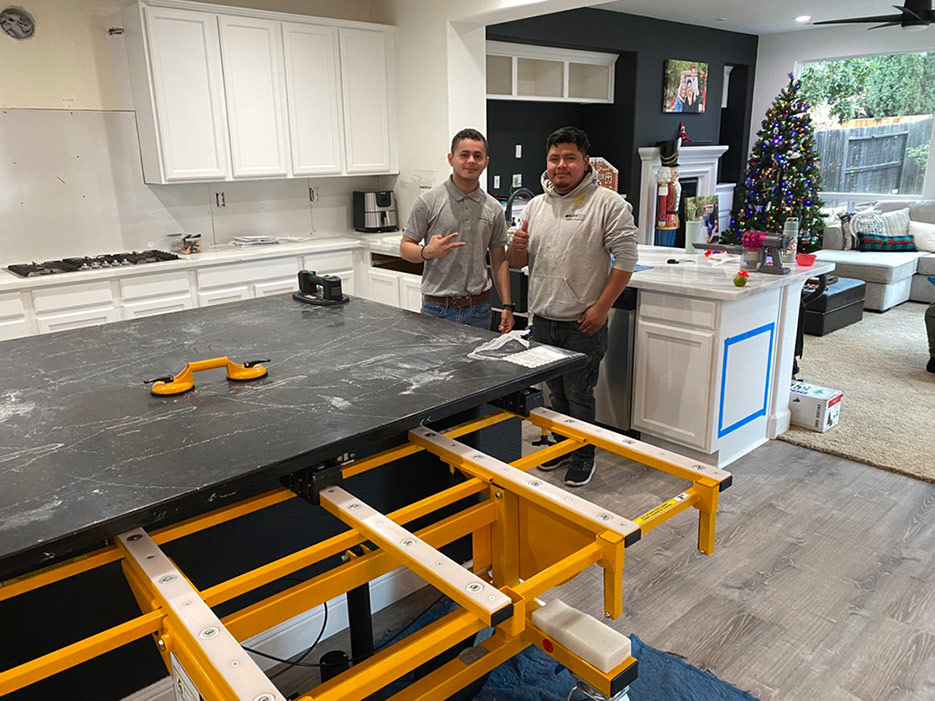 |
|
Above: A Block Tops installer team from the Anaheim office moves a full size island into place with their No-Lift Cart. Below: Block Tops, Anaheim install crews |
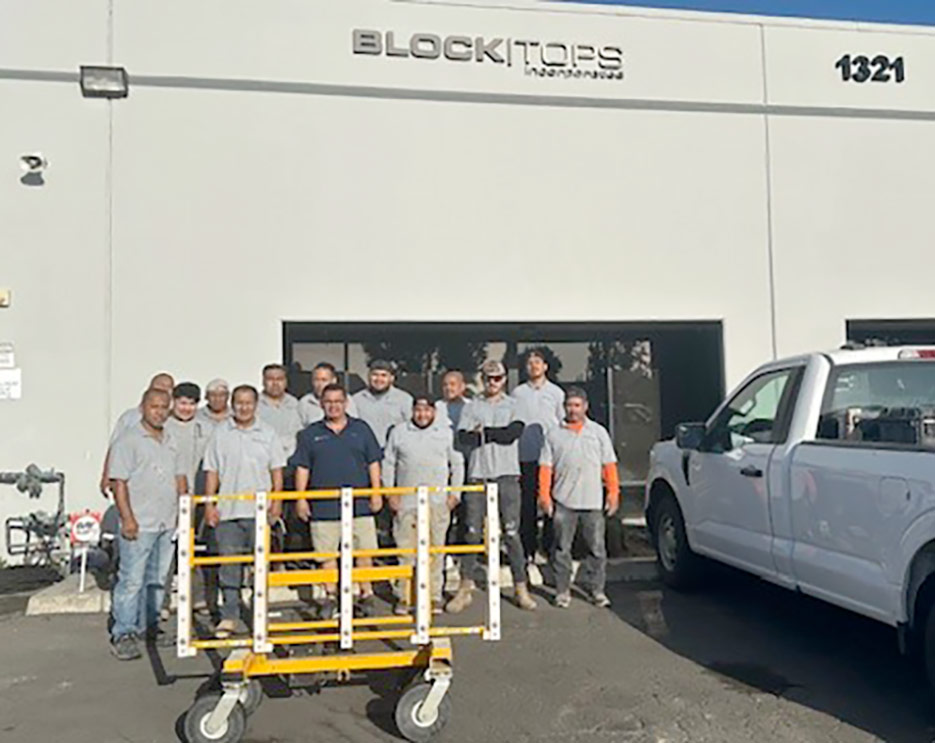 |
|
Below: Block Tops Anaheim, California office staff. The Anaheim office is the original and main branch, and is setting standards in terms of wet fabrication and dust control. |
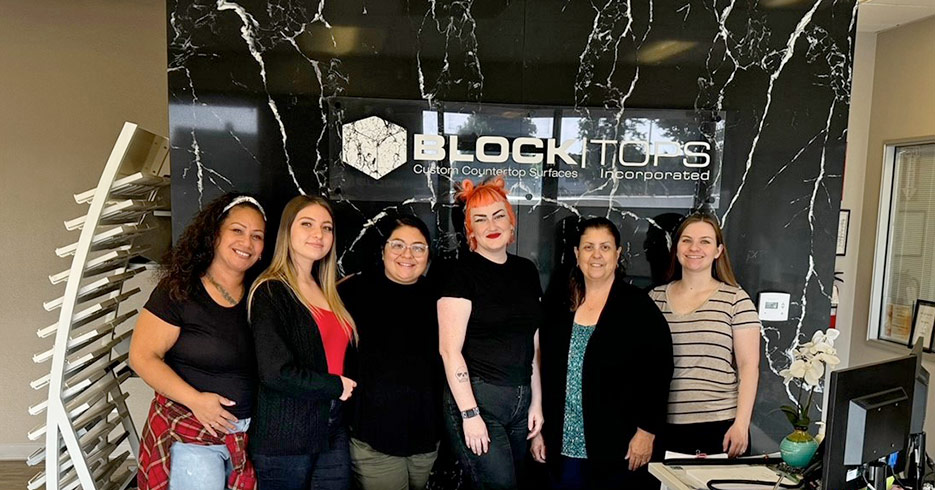 |
|
Below: The Anaheim shop fabrication team in front of their BACA SawJet. |
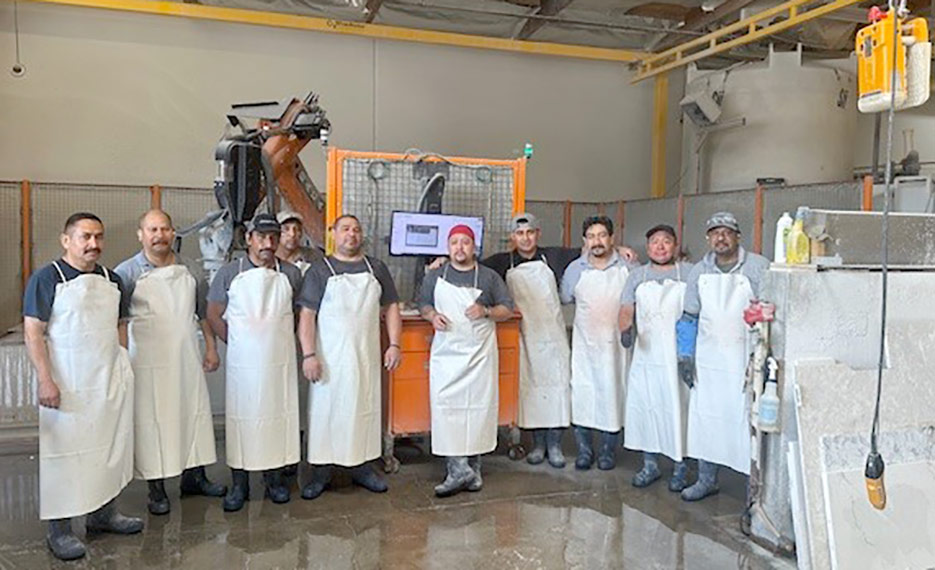 |
Go Wet, Young Man!
From the very beginning, Kolenski didn’t know about the silica issue, but knew he didn’t want all the dust, he recalled. “Some were saying that we needed a way to dry cut reinforcement rods or whatever, and we simply said no dry cutting or grinding at all! It has to be done wet. This one decision really helped us when the 2016 OSHA regulations came out. So we were ready, and when we started getting air testing, being a fully wet shop really helped, especially when the public health guys came into our shop for tours, saying it even smelled different in here! For us, being wet is not only healthier, it turns out it’s also the better, faster option. You just have to figure it out, and once you know, you know! BACA and Park Industries are our go-to equipment manufacturers. Parts are readily available, they are reliable, and both companies have done a really great job for us. They are good guys, too!”
According to Kolenski, company team members are always kept below 100, and all are considered family. “Some of them have been with us for 35 years, many for over twenty. A lot of our newer guys have the most potential while learning the trade, and are very excited about it. We have a certain way of doing things, and very seldom do we bring anyone in from another company. So most of our shop guys are home-grown, and once they learn the craft, they feel like part of the team, because they were taught by their peers and successful because of their peers. Our plant manager came from Honduras 15 years ago not knowing anything about fabrication. He learned the language, learned the craft, and now runs our Sacramento location. He is the most effective manager we have. He exudes Block Tops, and I would put him up against anyone in the industry. Products and machines you can buy, character you can’t teach. It is part of our people.”
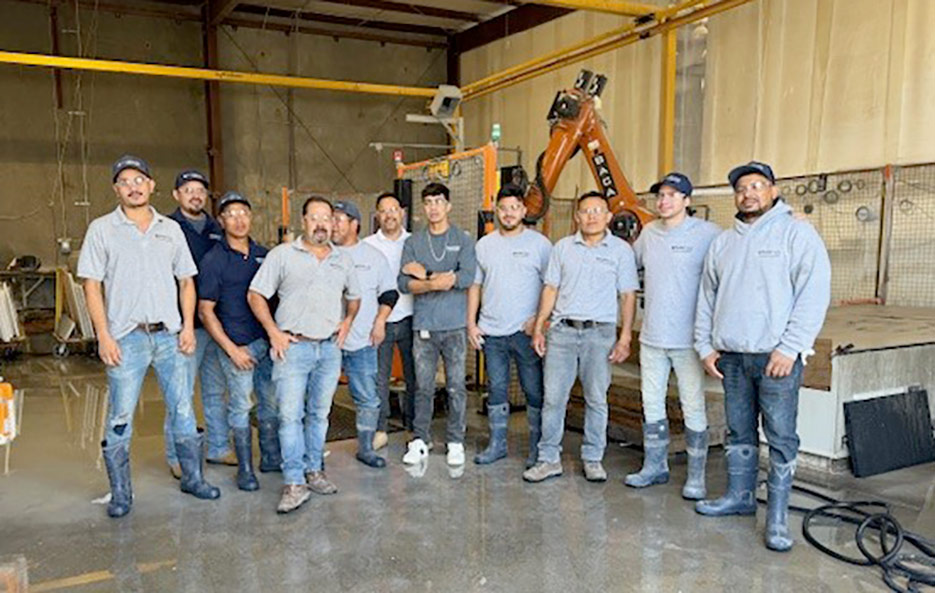 |
|
Above: The Sacramento Block Tops fabrication crew. Both locations use BACA machines, and also Park Industries equipment. Below: The Sacramento install crew, and a locked and loaded full-size slab ready for transport to a nearby jobsite. |
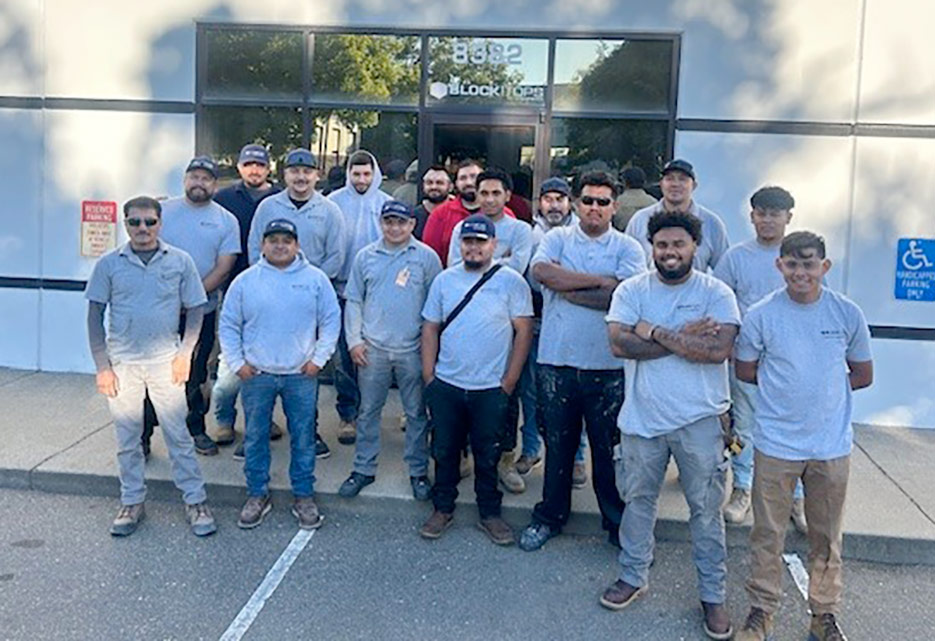 |
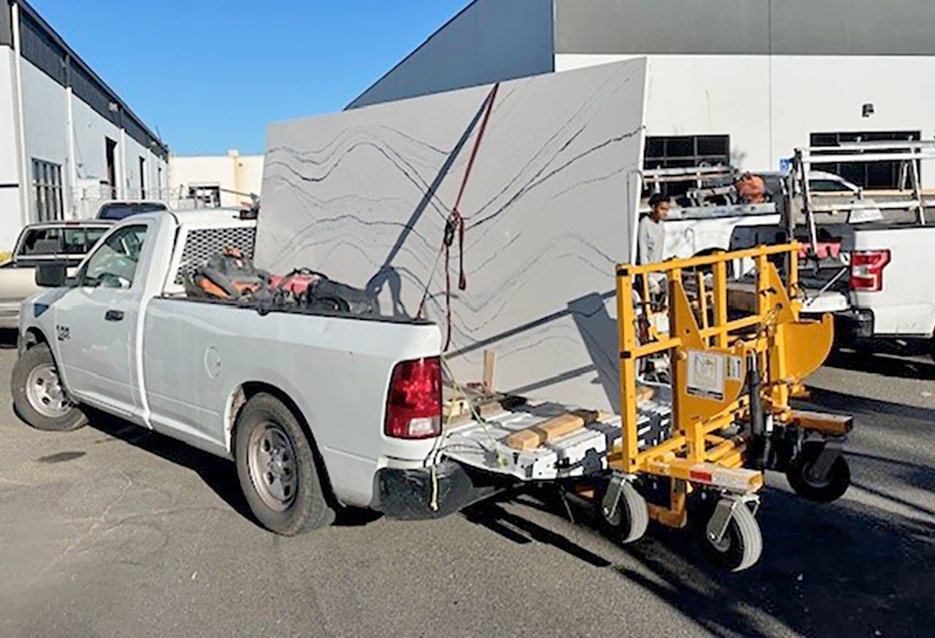 |
|
Below: The Block Tops Sacramento, California office staff. |
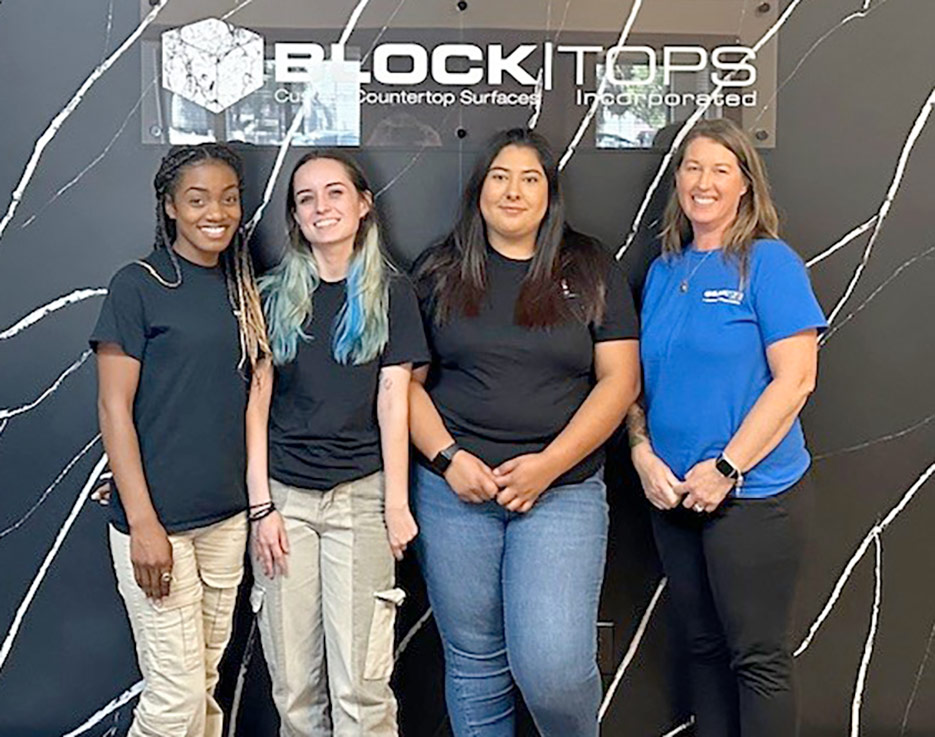 |
Big on Big Box
A major percentage of the company’s output is to multiple big box companies such as Home Depot, which is currently their biggest customer, and has been doing business with Block Tops since 1990. Approximately 90% wholesale, Block Tops also caters to other revenue sources such as kitchen and bath dealers as well as a wee bit of commercial and contractor work, explained Kolenski. “We try to keep our commercial work to jobs that get done quickly, because one of our priorities is a low level of debt. You actually have to pay us if we do a job, and some of the big commercial jobs just string-out the money too long! So we focus on the smaller, quick turn jobs.”
Taking Silicosis Prevention to the Next Level
If you’ve been listening to the news these days, you might have heard how the silicosis warnings in our industry are ramping up. New warnings are specifically aimed at the manufacturers and fabricators of quartz products, and echoing mostly through California’s halls of justice, at least for the moment. Most fabricators understand that this is not a new problem, and clearly, this problem is not just going to go away. No Siree! If not dealt with from every angle, first by industry leaders, then by shops using stone products, it promises to fester and grow bigger by the year. Though not a simple fix, it is one of those situations, that if we do not take responsibility, someone else will, and the outcome will not be pretty, explained Kolenski in great detail.
“Engineered stone has eclipsed natural stone in just the last few years to become 65% percent of our sales. Prior to this, it had been approximately 50/50. I’m not sure if this trend will continue, due to all the silicosis stuff going on. L.A. County and Australia have focused on engineered stone as a silica issue, so I don’t know.
“As it turns out, quartzites also have very high silica content, but they weren’t even considered, at first. Now, though, it looks like the regulations and legislations are focused on treating all stone materials the same, and it’s difficult to say with certainty what affect this will have on the consumers. So far, we’ve only had a handful of customers ask about the new silica concerns, but whatever happens with the regulations, it could certainly affect sales.
“That said, it really is difficult to predict what the next five years will bring. With the legislations that we are helping to work on, such as licensing fabricators before they can purchase materials, this will make a huge difference, because you can’t control safety by enforcement, due to safety enforcement personnel being under staffed. We saw the 2016 OSHA rules that weren’t being enforced, and the only way to stop that is to control who can get product. If that goes through, and it’s a good law, companies like Block Tops will have a good opportunity to increase market share, because of the ones that can’t or won’t comply. That law in a good, clean bill will give the guys who care about safety and doing the right thing the advantage, and winnow out the bad actors and the guys who take dangerous short-cuts. Conversely, if they just keep putting regulations on guys like us who are trying to comply and don’t do anything to the guys that aren’t, it’s going to choke our opportunities, and our costs are just going to keep going up. It can be expensive to do the right thing for the safety of your employees, and it’s easier to not comply if there is no punishment. So the next five years will be very interesting.”
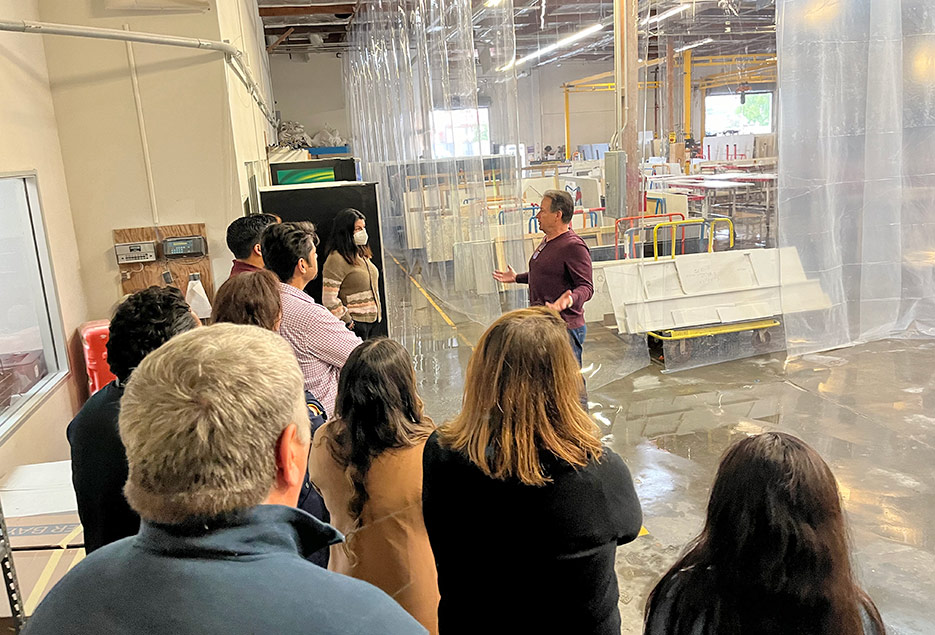 |
|
NSI CEO Jim Hieb joined ISFA board president Ted Sherritt for a meeting of California public health officials hosted by Nate Kolenski at the Block Tops Anaheim facility, which is an NSI Accredited fabrication shop. The meeting helped officials understand what a silica-safe shop looks like, and showcased industry training resources available to stone companies. |
The Bottom Line
In closing, if you’re in fabrication for the long haul, you should think about joining the NSI and ISFA, because they spend a lot of time and money to fight for you. Also, think about taking the NSI silica and slab safety class that will deliver a whole lot of critical information, so you can be aware of the problem and not part of it. Then, get fully wet, if you’re not already, and add air purification, if you haven’t, and try to keep the air quality standard below the action level. If it does rise above the action level, immediately deal with it by making location, machine, or personnel changes. Continue to test your air and get your people tested regularly. Wash down the floors every night and wet down all pathways every morning.
Additionally, read current OSHA and state regulations, and when you’re confident that you’ve done all you can, sign up for a voluntary OSHA consultation. There is no fine if any problems are corrected immediately, and it protects you for a year from any enforcement guys coming in. After this, it is time to pat yourself and your team on the back, and invite local public health officials and state legislators in for a tour. They have a lot of power, they are compassionate, and they really do care about worker’s safety, but by and large, really don’t know our industry. If we had done this a few years ago, we’d be in a better position to not be lumped together with non-compliant shops.
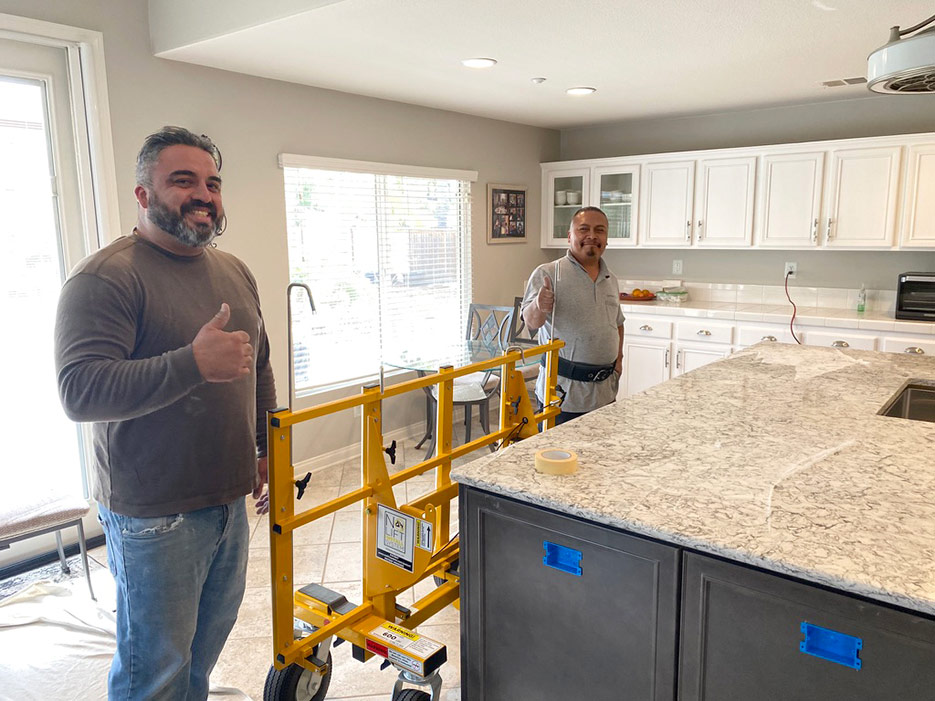 |
|
The Block Tops Sacramento, California install teams love their No-Lift Install system carts. Safety in all aspects of the job is important at Block Tops. The company has several No-Lift carts, and uses them in both locations. |
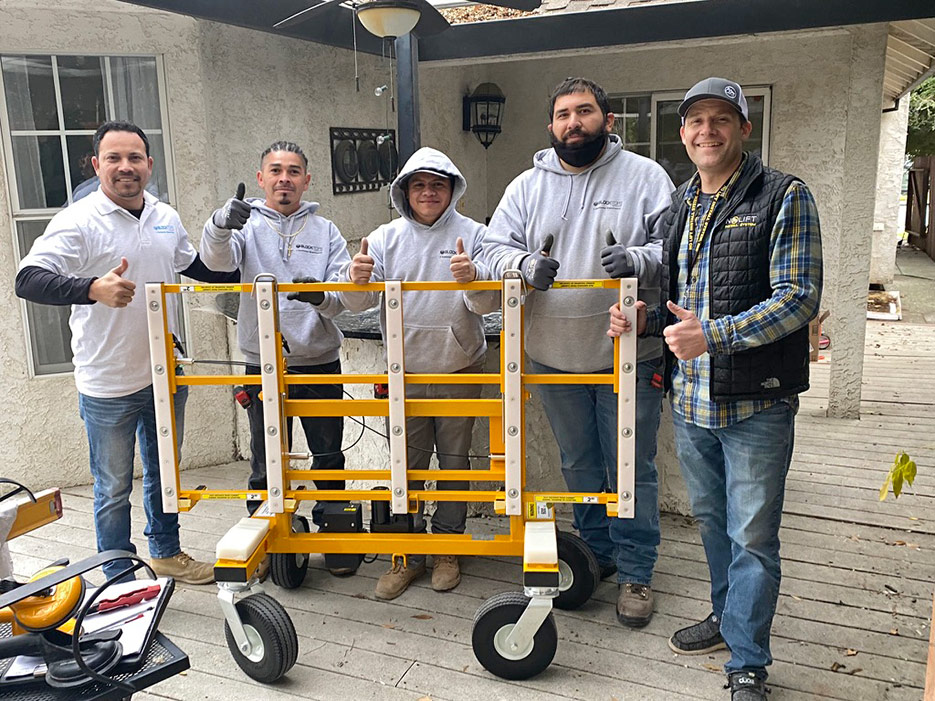 |
Block Tops Inc. is a member of the Natural Stone Institute and the Stone Fabricator’s Alliance.
For more information, visit www.block tops.com .